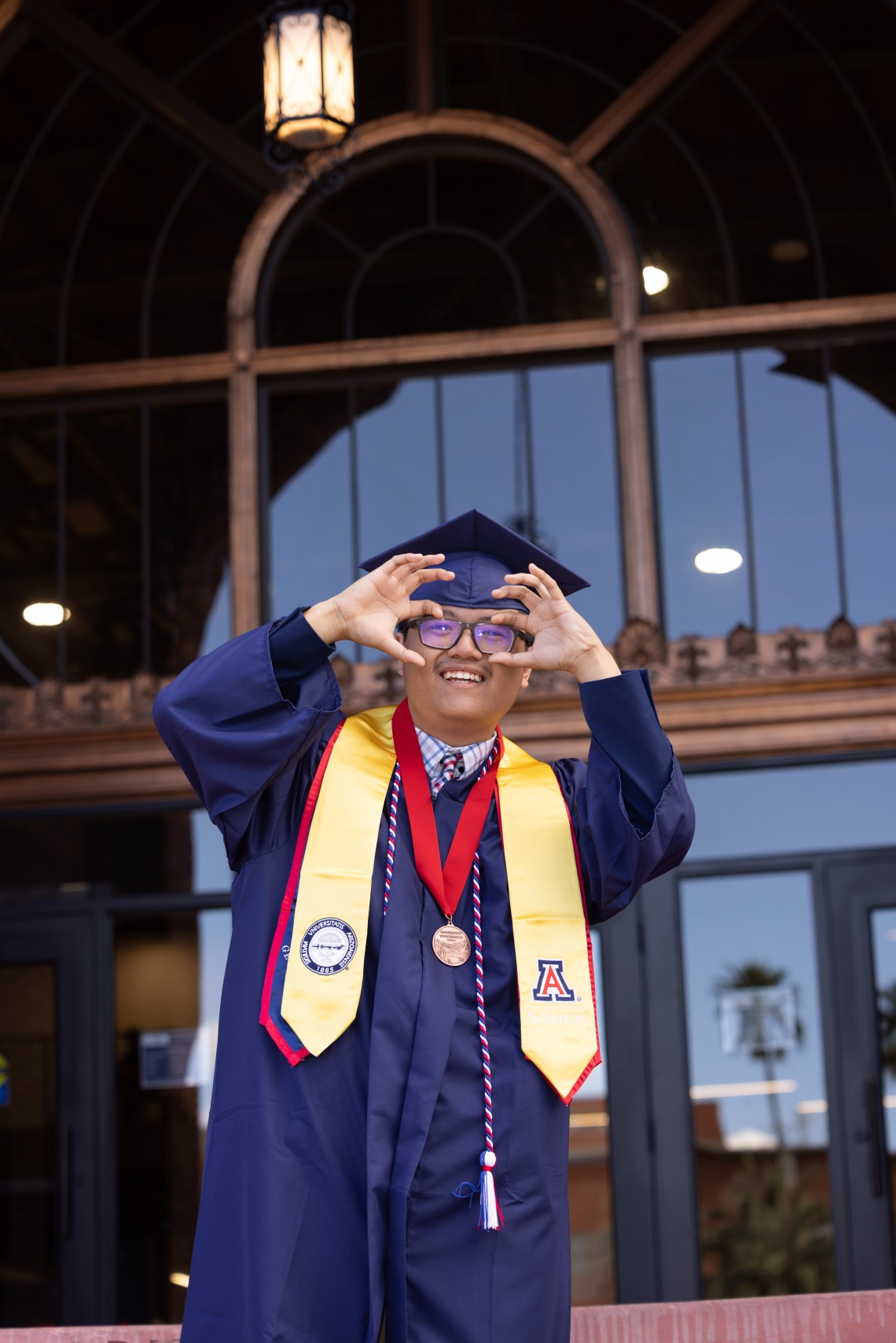
Congratulations to Bao “Tintin” Nguyen on receiving the 2024 Merrill P. Freeman Medal! This spring, Nguyen graduates summa cum laude with honors with a Bachelor of Science in physics, astronomy and mathematics. The Merrill P. Freeman Medal is named in honor of Merrill Freeman, who served the University of Arizona as a regent and chancellor. Qualifications for the award include outstanding character.
Growing up in Ho Chi Minh City, Vietnam, Nguyen initially fell in love with astronomy after receiving a solar system toy model from his parents. The interest grew when he saw dazzling black hole visualizations in the sci-fi movie “Interstellar.” In 2019, gazing at the first direct black hole image – the result of an international effort led by researchers at the UArizona Steward Observatory – he realized his desire to pursue astrophysics.
Under the mentorship of Chi-Kwan Chan, an associate astronomer at Steward Observatory, and former Stweard postdoc Pierre Christian, Nguyen investigated how the strong gravitational pull of black holes distorts light rays or forms hot glowing disks with matter spiraling into these cosmic behemoths. His effort on the observational signatures of super-spinning black holes culminated in a lead-author publication in The Astrophysical Journal and two talks at the American Physical Society conferences. He also spent summer 2023 as a research intern at the Harvard-Smithsonian Center for Astrophysics.
Nguyen is passionate about education and outreach in science, technology, engineering and math. He previously served as a teaching assistant in two calculus courses. He was a tutor in Mentorship and Education in Science for Tucson, an initiative to support Native American high school students in math courses. Currently, he serves as a leader in the Tucson Initiative for Minority Engagement in Science and Technology program and as a lead undergraduate research ambassador at the university.
Nguyen has been honored with the 2024 Excellence in Undergraduate Research Award by the astronomy department, the Galileo Circle Scholarship, the Weaver Award for Undergraduate Research in Physics, the David Lomen Excellence in Mathematics Award, the W.A. Franke Honors College’s Richard Kissling Spirit of Inquiry Scholarship, the Global Wildcat Award, and the Undergraduate First Prize of the Data Visualization Challenge.
Nguyen plans to pursue a doctorate in astrophysics and hopes to continue mentoring undergraduates and volunteering in outreach initiatives to bring astronomy to the public. He eventually hopes to follow in the teaching footsteps of his grandparents by becoming a professor and improving access to astronomy education and research opportunities in his home country of Vietnam.
Read his interview below!
What brought you to Steward Observatory?
I grew up in Ho Chi Minh City (Vietnam), a bustling city of over 10 million people, so there wasn’t any starry night sky that made me fall in love with astronomy. What initially sparked my astronomy interest instead was the solar system toy model gift from my parents when I was a kid and the dazzling black hole visualizations in “Interstellar” during middle school. The first direct black hole image from the Event Horizon Telescope in 2019 was a major inspiration that convinced me to pursue astrophysics, when I realized that though black holes are so faraway, I can still study them! I decided to pursue my undergraduate degree at Steward because of the world-class astronomy program and research opportunities here, as well as the chance to work with Event Horizon Telescope members.
Can you describe your research and any especially interesting learning experiences you’ve had during your time here?
I spent 2 years learning about how the strong gravitational fields of black holes distort light rays and form hot glowing accretion disks with Dr. Chi-kwan Chan and Dr. Pierre Christian. Last year, I published a lead-author paper on the observational signatures of Kerr naked singularities, theoretical objects emerging when black holes spin so fast that their event horizons vanish. Last summer, I interned at the Harvard-Smithsonian Center for Astrophysics and investigated many high-redshift overmassive black holes recently observed by JWST with Dr. Fabio Pacucci. As a fun side project outside of astrophysics, I published a paper in the Arizona Journal of Interdisciplinary Studies on philosophical topics like determinism, free will, and moral responsibility through the lenses of social science, natural science, and theology. My favorite experience is attending the January 2024 AAS meeting in New Orleans!
What’s your greatest point of pride from your time at Steward?
I was so excited to publish my first lead-author paper in the Astrophysical Journal last year! It was a rewarding two-year journey working on this project, so I was proud to see it come to fruition! I’m so grateful for Dr. Chi-kwan Chan and Dr. Pierre Christian for their incredible support and mentorship in this project. Also, I just learned that I will receive the 2024 Excellence in Undergraduate Research Award in Steward, so I’m grateful for all the opportunities I’ve had at our department.
Can you share piece of wisdom from your time as an astronomy student?
Don’t hesitate to reach out, ask, and learn from the wisdom of others – professors, researchers, graduate students, peers, and everyone else in your life.
What’s next?
I’m joining the Astronomy Ph.D. program at Harvard University in Fall 2024! I plan to continue working with many Event Horizon Telescope members and doing research in black holes! My research aspiration is to bridge the gap between theory and observations of direct black hole imaging through analytic calculations and simulations.